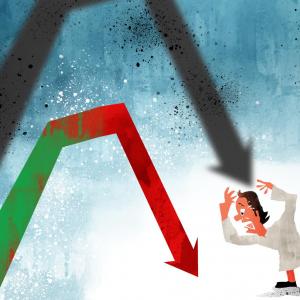Multi-asset funds offer exposure to gold, which tends to do well in times of geopolitical tensions and inflationary pressures, suggests Sanjay Kumar Singh.

The BSE Sensex fell a steep 2,702 points (4.7 per cent) after Russia attacked Ukraine.
Investors keen to safeguard themselves from downside risk may seek refuge in a diversified category like multi-asset funds, which invest across equity, debt and gold.
Flexible asset allocation
According to the Securities and Exchange Board of India (Sebi) norms, multi-asset funds must have 10 per cent exposure each to equities, debt and gold.
Aggressive hybrid funds need to maintain a minimum 65 per cent allocation to equities.
This can make them susceptible when there is a downturn of the magnitude seen on Thursday.
"In our multi-asset fund, the equity exposure varies from 25 per cent to 65 per cent. A fund like this, which has greater flexibility in asset allocation, can provide better downside protection," says Chirag Mehta, senior fund manager-alternative investments, Quantum Mutual Fund, who looks after Quantum Multi-Asset Fund.
At the same time, these funds can take advantage of opportunities thrown up by the market.
"In March 2020, before the market fell, our equity allocation was 26 per cent. After the fall, we raised it to more than 50 per cent within a month," adds Mehta.
Multi-asset funds also offer exposure to gold, which tends to do well in times of geopolitical tensions and inflationary pressures.
A fund manager decides on asset allocation in these funds.
"Professionals are less likely to be affected by behavioural biases than individual investors," says Vishal Dhawan, chief financial planner, Plan Ahead Wealth Advisers.
Investors can outsource their entire portfolio to a fund manager here.
"Decisions like asset allocation, when to change it based on market outlook, and the instruments to invest in are all handled by the fund manager," says Arun Kumar, head of research, Fundsindia.com.
When investors hold separate equity, debt and gold funds, rebalancing carries costs, like tax incidence and exit load.
When a fund rebalances, the investor does not bear any cost.
Loss of control
The investor, however, loses control over investment decisions.
The fund manager decides based on market outlook, and not on the investor's preferences or needs.
"With a war starting, you may want higher exposure to gold. But the fund manager may perceive the fall in equities as an opportunity to invest more," says Dhawan.
A similar contradiction can arise when the investor is approaching his goal and prefers a lower equity allocation.
Investing a part of your corpus in these funds can give rise to problems.
"Developments within the fund could nullify what you're doing in the self-managed part of your corpus," says Kumar.
If you hold separate equity, debt and gold funds, the equity funds will get preferential tax treatment.
In a multi-asset fund, the entire portfolio gets the debt fund treatment.
Study the strategy
Funds within this category run varied strategies. Allocation to equities can vary.
Some may have a more static asset allocation while others may be more dynamically managed.
Some are actively managed, while others invest in passive funds.
"Examine the fund's strategy closely. Select one that matches your risk appetite," says Kumar.
Many funds within this category have a limited track record.
Dhawan suggests avoiding those that don't have at least a three- to five-year track record.
He adds that investors should prefer those that have a lower expense ratio.
According to Kumar, investors should avoid those that have very small assets under management.
First-time equity investors, or those who have entered the equity markets recently, may opt for these funds with a minimum three-year horizon.
Experienced investors, or those who have an advisor handling asset allocation, should opt for separate funds for greater flexibility and control.
Those who already have adequate gold should also think twice before investing in these funds.

Feature Presentation: Aslam Hunani/Rediff.com










